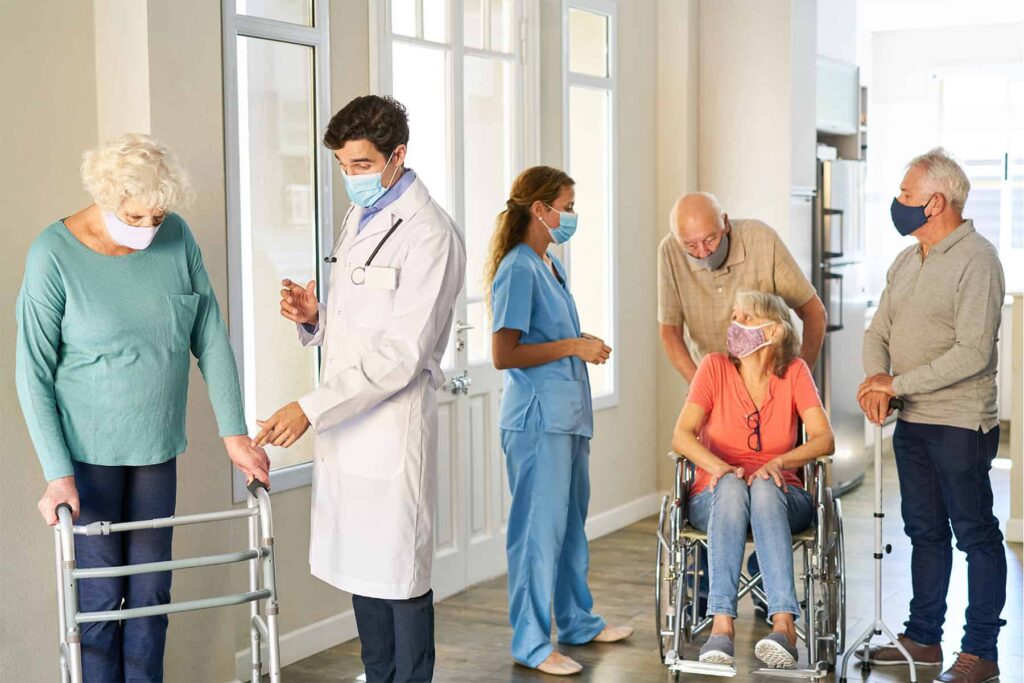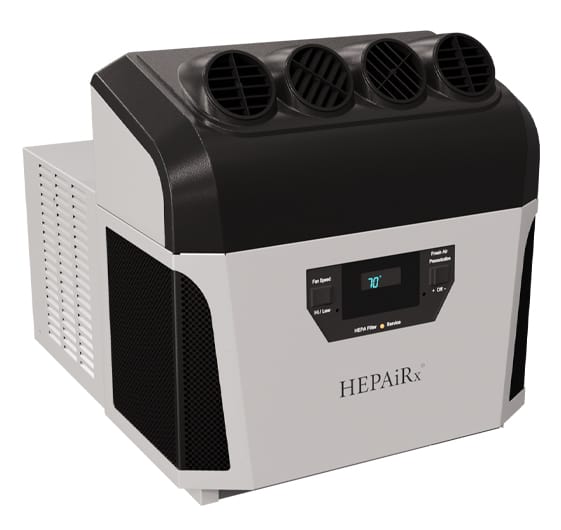
As beloved elderly family members age, many require increased living and medical support levels and move into nursing homes. These residential facilities provide round-the-clock care to keep their patients as healthy and happy as possible. However, between their naturally lowered immune systems, comorbidities, and living in relatively close quarters, keeping senior citizens safe in nursing homes is challenging.
A primary concern about older people is exposure to potentially life-threatening infections, like COVID-19. A less immediate worry is poor indoor air quality. Air Innovations HEPAiRx® system was designed to purify small spaces of particles carrying contagious diseases in under 15 minutes and to reduce chemical gases by introducing regulated outside air.
Risks Facing Elderly Residents
Four factors make nursing homes potentially dangerous for the elderly. One, as people get older, their bodies age, including their immune systems. They are less able to fight infection and less able to generate antibodies after vaccination. Even taking precautions, senior adults are more vulnerable to airborne particles and contaminants that make them sick.
Two, by the time many people grow older, they have acquired one or more disease diagnoses. Conditions such as diabetes, pulmonary illness, compromised teeth, and degenerative diseases put nursing home residents at risk for infections.
Next, the very nature of living in a communal setting can pose risks. Like schools, offices, and apartment complexes, people living and working in close quarters have a greater chance of contracting or spreading infectious diseases.
Lastly, exposure to volatile organic compounds (VOCs) can have short- and long-term adverse health implications. VOCs are gases emitted from various household products, including new carpets, aerosol sprays, paint, and air fresheners. VOCs originate indoors and can cause minor eye, nose, and throat irritation at one end of the spectrum and liver, kidney, and central nervous system damage at the other.
Pressure Control in Nursing Home Bedrooms
Nursing home residents are in one of two states of health. They are free of infection, or they have been exposed to contaminants in the air and have become ill. Each circumstance requires different conditions to protect residents and those around them.
How to Protect the Healthy
Positive pressure rooms are effective at keeping people free of infections. These spaces maintain higher air pressure inside the room than the surrounding environment. As a result, air can leave the room without circulating back in. Germs and other potential contaminants outside a room cannot get in. In a hospital setting, positive pressure rooms are also referred to as Protective Environment (PE) rooms because they keep residents safe. There is no reason PEs should be limited to medical facilities or emergencies.
When Residents Become Sick
On the other hand, negative pressure rooms keep contaminants inside a space, so infectious germs don’t spread through a facility HVAC system. Negative pressure rooms maintain a lower air pressure than the air outside of the room. These rooms are commonly used in hospitals to control infections.

The Flip of a Switch
In a perfect world, nursing facilities would be able to accomplish both. Staff and family could increase the odds that residents stay healthy by providing positive pressure bedrooms. If they are exposed to contaminants outside of their living quarters by chance, staff could flip a switch to transform the same room into a negative pressure environment. HEPAiRx is the only unit on the market that can achieve negative or positive pressure at the flip of a switch.
HEPAiRx is an air filtration device that is comparable in size to a standard AC window unit. It quickly and thoroughly purifies a room of airborne particles and contaminants. Each unit uses medical-grade HEPA filtration and ventilation to exhaust air for a standard-sized room every 30 minutes.
HEPA Filtration
Becoming sick with a virus is not solely about exposure. A person must be exposed to enough particles to become infected. A HEPA filter keeps the number of particles that carry viruses and other variables low enough to keep patients well. One hundred percent of the air handled by the HEPAiRx will pass through a medical-grade HEPA filter, which reduces the number of particles that carry viruses by 95+%.
Dedicated HVAC
Cross-contamination is always a risk when a central HVAC system is used to maintain climate control. Most facilities rely on elaborate ductwork to connect individual rooms to mechanicals that keep them comfortable. HEPAiRx has onboard heating and cooling features that keep residents comfortable while isolating them from adjacent spaces.
Fresh Air for the Win
One way to rid a space of those nasty VOCs is fresh air – the most effective dilution mechanism. Bringing fresh air into a room through an open window can be expensive because it typically comes with higher energy costs. HEPAiRx brings in a high enough quantity of fresh air to naturally dilute VOCs without the energy hit due to an onboard energy recovery device.
Carbon filters absorb these harmful gases but are expensive and not conducive to use in bedrooms.
UV Protection
UV-C radiation is also known to kill 99.9% of harmful viruses and bacteria and helps maintain a sterile environment for residents and healthcare workers. HEPAiRx systems feature optional upstream UV-C to kill viruses trapped on the intake side of the HEPA filter to give nursing home residents an extra buffer against life-threatening elements.
A Final Word
The best way to protect the most vulnerable is to mitigate exposure to infections and unhealthy indoor air through air purification. Leaving exposure to chance is unnecessary and has devastating consequences. The number of seniors who lost their lives to COVID is a staggering reminder.
HEPAiRx is an ideal solution for use in nursing homes. Since it is entirely self-contained and compact, facilities don’t have to overhaul their existing HVAC systems. This plug-and-play solution is the best defense for our elderly family members and the staff and healthcare workers who care for them.
